Related Research Articles

Anthony Martin Kimmins, OBE was an English director, playwright, screenwriter, producer and actor.

Frank Harvey was an English screenwriter and playwright who jointly won a BAFTA Award with John Boulting and Alan Hackney for I'm All Right Jack in 1960. During his career he was nominated for a second BAFTA for Private's Progress.
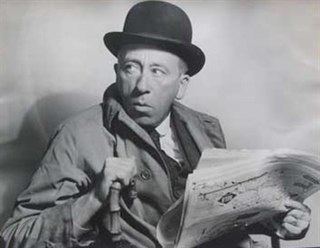
William Gordon Harker was an English stage and film actor.

The Silver King is an 1882 melodramatic play, by Henry Arthur Jones and Henry Herman. It was "so well known that criticism is superfluous" and played to record-breaking audiences. It was adapted for films in 1919 and 1929. The play featured stars such as Mary Pickford, with Phoebe Carlo playing Ned in the original production.
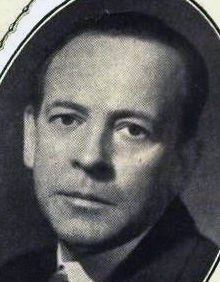
Frank Harvey was a British-born actor, producer, and writer, best known for his work in Australia.
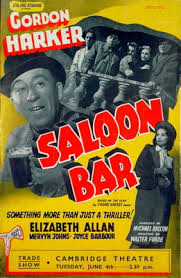
Saloon Bar is a 1940 British comedy thriller film directed by Walter Forde and starring Gordon Harker, Elizabeth Allan and Mervyn Johns. It was made by Ealing Studios and its style has led to comparisons with the later Ealing Comedies, unlike other wartime Ealing films which are different in tone. It is based on the 1939 play of the same name by Frank Harvey in which Harker had also starred. An amateur detective tries to clear an innocent man of a crime before the date of his execution.
Someone at the Door is a British comedy thriller play by Campbell Christie and Dorothy Christie which was first staged in 1935, and ran successfully at the Aldwych, New and Comedy theatres in London's West End.
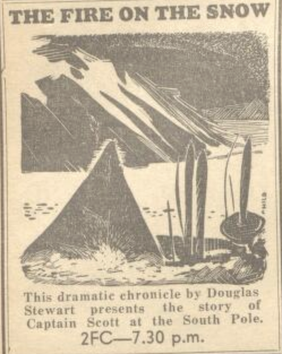
The Fire on the Snow is a 1941 Australian verse play by Douglas Stewart about the Terra Nova Expedition to Antarctica by Robert Falcon Scott. It premiered on ABC radio on 6 June 1941 to great acclaim and inspired a series of Australian verse dramas on ABC radio.
Warn That Man! is a 1941 comedy thriller play by the British writer Vernon Sylvaine. A comedy-thriller, its plot concerns an attempt to kidnap wartime Prime Minister Winston Churchill from an English country house.
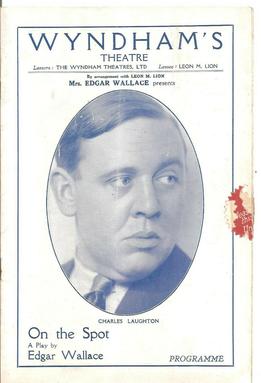
On the Spot is a 1930 Chicago-set play by the British writer Edgar Wallace. Wallace was inspired by a visit to the United States and, in particular, the Saint Valentine's Day Massacre. Known as a prolific author, he reportedly dictated the manuscript for the play in just four days. It was his greatest theatrical success.
The Calendar is a 1929 play by the British writer Edgar Wallace. It is a crime thriller set in the world of horse racing world, the sport being among Wallace's interests. The protagonist is a financially struggling racehorse owner with a shady reputation. It premiered at the Palace Theatre in Manchester before transferring to Wyndham's Theatre in the West End.
The Old Man is a 1931 mystery play by the British writer Edgar Wallace. Its original production was staged at Wyndham's Theatre in London's West End for a ninety performance run. It is set entirely in the "Coat of Arms" tavern where a mysterious old man lurks in the background, reputedly an escapee from a lunatic asylum. The original cast included Alfred Drayton, Jack Melford, Harold Warrender and Finlay Currie.
Norman Ginsbury (1902–1991) was a British writer, known for his plays. He also wrote material for film and television.

There's Always Juliet is a 1931 comedy play by the British writer John Van Druten about an American architect who falls in love with an Englishwoman.

Blondie White is a 1937 mystery play by British writer Jeffrey Dell and Bernard Merivale. A murder mystery, it was inspired by an earlier play by Hungarian writer Ladislas Fodor. A famous crime novelist helps Scotland Yard to solve the murder of a nightclub performer, Blondie White.
Suspense is a 1930 play by the Irish writer Patrick MacGill. Set during the First World War it focuses on a small group of soldiers who are aware that the Germans are building a mine under their trench and have to sit waiting for the enemy to detonate it.
Road House is a British play by Walter C. Hackett.
Afterwards is a 1933 mystery play by the British-American writer Walter C. Hackett revolving around a psychic medium.
My Wife's Family is a comedy play by the British-based American writer Fred Duprez based on an earlier story by Harry B. Linton and Hal Stephens. It premiered at the Princes Theatre, Bradford before transferring to the Garrick Theatre in London's West End where it ran for 118 performances between 3 March and 13 June 1931. The original West End cast included Ernie Lotinga, Arnold Bell, Hugh E. Wright and Joan Ingram. It was revived on a number of occasions and made into several films. A farce, the play's comedy revolves around a newly-married wife who overhears her husband talking about a Baby grand piano and mistakenly believes he has an illegitimate child.
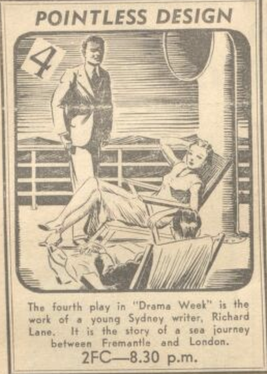
Pointless Design is a 1938 Australian radio play by Richard Lane. It was Lane's first notable radio work although his second one produced. It was inspired by Lane's travels to Europe.
References
- ↑ Wearing p.769
- ↑ "Actor Adapts Son's Play For Radio Cappy Ricks Plays For Broadcast", The Wireless Weekly: The Hundred per Cent Australian Radio Journal, vol. 36, no. 46, Sydney: Wireless Press, 15 November 1941, nla.obj-722446538, retrieved 17 March 2024– via Trove
- ↑ "Saloon Bar". British Film Institute. Archived from the original on 14 January 2009. Retrieved 20 April 2014.